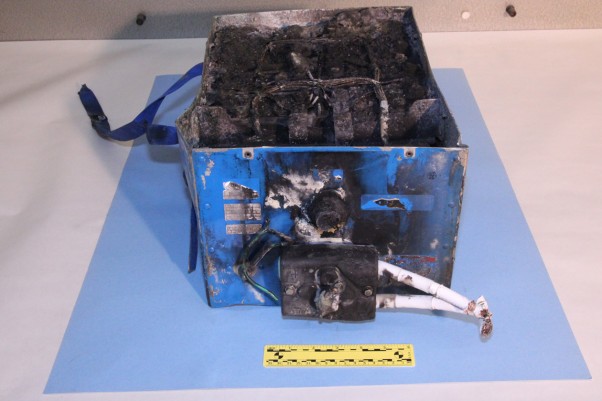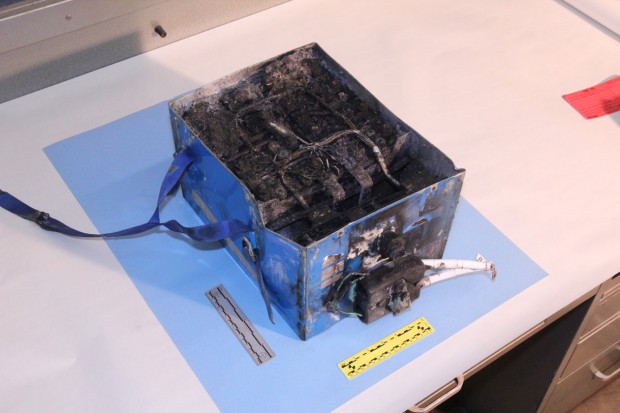What kind of battery? You guessed it, lithium-ion ![]()


What kind of battery? You guessed it, lithium-ion ![]()


I’m quite surprised that they used “ordinary” Lithium Cobalt oxide chemistry batteries for such a demanding purpose.
http://www.s399157097.onlinehome.us/SpecSheets/LVP10-65.pdf
Obviously something went very wrong in this case…
Always seems to take accidents to call enough attention to safety issues. Glad it happened on the ground.
Really Really STUPID! We can put a man on the moon...multiple times, A rover on Mars that can take pictures of itself & send them home, play in the Mars dirt and analyze its findings.... But we CAN'T seem to build batteries that are safe for heavy use in automobiles and airplanes. There is just something wrong with this entire senario! 
Dan.
wow, the battery case looks just like the ones they use for ni cad cells, except those are 30+ years old maybe, lol
It looks like they (had to) rushed things to get dreamliner in service asap. Is it so irrational to expect them to learn something from history ?
There has been a second fire, this time in-flight in Japan. Boeing 787’s li-ion batteries again. US FAA has grounded all Boeing 787 dreamliners. Cause death by fire isn’t most peoples idea of a dream.
Dreamliners? More like Nightmareliners!
Boeing is more focused on safety than any Company in the World! I would fly any of their aircraft, anytime, and especially the 787 Dreamliner. Aircraft which exceed technology and comfort boundaries to satisfy their world-wide customer-base will always be subject to sub-tier suppliers which try and use undisclosed replacement and/or obsolete parts (I am not stating this is the case with the battery and/or charger), but more than likely, it certainly can happen, and whatever the case will be found out and fixed by Boeing. Those suppliers will also face significant repercussions. Ultimately, Boeing is acting above board and will disclose everything found. I will fly nothing but Boeing. “If it ain’t Boeing, I ain’t going”. You can count on a root-cause resolution and vigilance to ensure public safety beyond any company in the world. Take this from a 33-Year veteran in the aviation industry. Honestly, Boeing is the best in the industry and the 787 will be the most successful aircraft in commercial aviation history. I would bet my life, and my family’s on it! Maverick :
Why does this sound like an ad?
Repercussions or not, if it fails you may not be around for a second try. A downed plane is far different from a laser printer failure
Low bidder won . . .
It does sound a bit like an ad, but I’ll actually second it. They may or may not be the MOST safety minded company in the world, but they’re up there. I’ve done a lot of work for Boeing over the years, and I can tell you firsthand that priority #1 is “Is it SAFE” and priority #2 is “Is it RELIABLE”. Everything else comes after that on the importance list… Weight, Cost, Complexity,etc are all important, but they’re all dwarfed by safety and reliability. If Boeing decided to put LiIon batteries in the 787, you can bet they had a BOATLOAD of analysis and data behind that decision. I’m very curious to see what the outcome of the investigation is…
PPtk
Just to take a different look, those Yuasa batteries could be "victims" of the accidents, not the culprit. When I look at the crisp-well-done battery pics, I see a metal box with many smaller cells inside. If the link supplied from Chiefinspector is the right one, those could be 8 pieces of LVP-65 batteries assebled together in a bigger module.
The wiring for their connections (series? parallel? mix?) could well be the initial failing point, a short and the wire immediately overheat and burn, and the overloaded cells going fire is the logical conseguence. In a similar scenario every kind of cells would have blown and/or fire.
Ok, Li-ion is certainly more dangerous when on fire and more difficult to estinguish, but even a 12v lead acid car battery going blown is not that funny!
Anyway, I'm not defending nor accusing anybody, those were just some personal thoughts.
Untill the end of the investigations, we are just playing speculations.
Of course I cannot claim that these batteries were used but based on information from Yuasa site they probably are…
Yuasa is company with long tradition I seriously doubt they would put their reputation to stake (not to mention legal repercussions) deliberately knowing that these batteries would fail. Real question is did yuasa supplied only batteries “as is” or they did the whole package (charging/protection circuit/casing) or was it done by another contractor. Nevertheless if those batteries are indeed common li-co chemistry that is certainly not the wisest choice as there are other “hybrid” variants that are much more tolerable when exposed to extreme conditions.
I was just reading other thread on BLF regarding li-ions and recent 787 problems FAA on Li-Ion fire in commercial aircraft and I got wondering could the problem be caused by repetitive change in environment pressure (if batteries are in unpressurized part of the plane) That might explain why numerous tests did not reveal any problems but when put in service time between cycles get shorter and their number increases.
Not only pressure but temperature. Do any of you recall the rudder control issues the 737s had in the 90's? It turned out to be a thermal shock issue with a bidirectional hydraulic servo causing the rudder to move in the opposite direction to that commanded by the controls. The problem was very intermittent. The thermal shock happened when the servo was chilled to -60 and then flooded with high temperature hydraulic fluid.
The aviation environment is very demanding.
FWIW, I read that the Li-ion batteries were only allowed on the 787 based on a design that vented fires/explosions of the batteries externally rather than into the cabin.
OT: I found this interesting article called "Guidelines on Lithium-ion Battery Use in Space Applications": http://ntrs.nasa.gov/archive/nasa/casi.ntrs.nasa.gov/20090023862_2009023573.pdf
every producer of large commercial jet aircraft is very very focused on safety. i’m positive in fact. i doubt airbus or anyone takes it less seriously than boeing. that’s silly.
Some details on the batteries used and possible causes of the fire:
http://www.eeweb.com/blog/davide_andrea/boeing-dreamliner-li-ion-battery-fire
There is a picture showing the enrolled insides of the cells, one has a hole..
Interesting document: Home
Apparently it was a “faulty wiring” that caused problem :~ Boeing is apparently proposing (among many other things) to make a new case for batteries out of stainless steel almost half inch thick (there goes weight saving…) and with additional ceramic spacers between batteries.
I’m no expert but pictures in that report above indicate that whole thing is seriously badly engineered. Putting backup battery for vital systems directly above main battery is plain stupid !
And why do they still insist on using plain li-co chemistry instead much safer hybrid variants ?!?